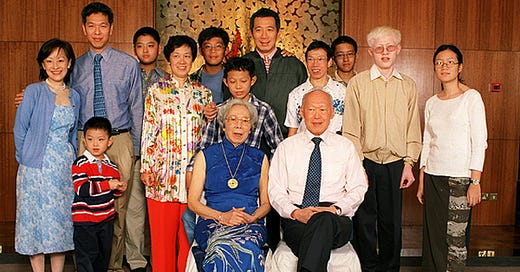Flurry of Political Activity in Singapore
New PAP leader named amid rumors of new Lee family entries into politics
Last week, applicable Singaporean civil servants were notified by election officials to attend online training for polls that are not due before September 2023 – apparently for the relatively meaningless election for the island nation’s presidency, a largely ceremonial role currently held by the 67-year-old Halimah Yacob although the office does oversee the national reserves.
But with the announcement of Singapore Finance Minister Lawrence Wong as the next leader of Singapore’s ruling People’s Action Party (PAP) on April 14, some Singaporeans speculate that general elections could be held as early as this year or next year, even though the deadline is November 2025. Wong is a longtime member of the PAP and there is little in his background that indicates he will cause any waves for Singapore Inc.
A presidential election that normally would be met with a yawn has generated considerable gossip over rumors that the leading candidate could be the 69-year-old Ho Ching, Prime Minister Lee Hsien Loong’s wife, who stepped down last October as CEO and executive director of Temasek Holdings, the government’s powerful sovereign investment fund. Her elevation to the presidency, if it were to happen, would transform her into an even more powerful position over Temasek. Although the role of president is largely ceremonial, he or she is the safeguard of the national reserves including funds managed by Temasek.
That has collided with other rumors that Li Hongyi, the Prime Minister and Ho Ching’s son, has decided at age 35 (on May 1) to accede to his parents’ wishes to enter politics – and with the anointing on April 14 of Wong as the leader of the so-called 4G team, the fourth generation of Singapore politicians, and the man likely to succeed Hsien Loong as prime minister.
The strait-laced government’s careful, rules-laden succession process has been a mess since 2021 when the designated 4G leader Deputy Prime Minister Heng Swee Keat was forced out, although he had been anointed two and a half years earlier, generating theories that Ho Ching and Lee Hsien Loong, now 70 and well past the date he originally gave for his departure from politics, wanted the brusque Chan Chun Sing, a former major general and army chief of staff who left the military in 2011 to run for office. Chan is now education minister.
The idea that Heng voluntarily stepped down was met with considerable skepticism at the time. He had been groomed for leadership in the PAP’s rigid system, serving as managing director of the Monetary Authority of Singapore, the country’s central bank, before successively serving as education minister and coordinating minister for economic policy, as well as PAP assistant secretary-general—all prestigious positions that led to his becoming deputy prime minister in 2018. An online petition, “Say no to Chan Chun Sing for PM!” garnered thousands of signatures.
Singapore's former deputy prime minister, Tharman Shanmugaratnam, a highly popular senior minister whom many Singaporeans wanted as their prime minister, endorsed Wong, as did Wong’s leading rivals Chan and Health Minister Ong Ye Kung. Tharman, although advanced in years, was considered clearly the most qualified as well as the embodiment of a multiethnic Singapore. It is highly unlikely, however, that anyone but an ethnic Chinese, who make up 76 percent of the island’s population, would be named Singapore’s leader. Indeed, all three candidates –Wong, Ong and Chan – are ethnic Chinese.
Ho Ching has not directly congratulated Wong on her Facebook page as of April 15 and only shared the congratulations of other PAP members one day after Tharman, Ong, Chan and some other ministers posted congratulations to Wong on their Facebook pages.
“Wow, I think she is speaking volumes,” said a Singaporean woman who declined to be named.
One source said both Lee Hsien Loong and Ho Ching preferred Chan Chun Sing as an alternative to serve as the next prime minister, while Li Hongyi was earning his political spurs and preparing to extend the Lee family rule of the island at some future point.
Repeated queries to the prime minister’s office over the possibility of Ho Ching and Hongyi’s entry into politics were met with silence.
The flurry of rumors involving Lee’s wife and son are delicate indeed. The Lee family are prickly over charges that Singapore’s Westminster parliamentary system is but a relatively thin tissue covering a Lee dynasty. Lee Kuan Yew, the founder of modern Singapore, ruled the government from 1959 to 1990 and as minister mentor dominated the interregnum government of Goh Chok Tong until Lee Hsien Loong took over in 2004 and has ruled to the present day.
The Lees have sued international publications at least twice and threatened others including the Financial Times for hinting about nepotism and in 2012 forced an apology from a domestic blogger who dared to intimate that top government positions have been filled with family members. The Lee family, and indeed the entire government and legal establishment, are adamant that extraordinary competence was the reason for the family members’ ascension to the top rungs of government.
Among other Lee family members who have held high positions in government are the elder Lee’s daughter, Lee Wee Ling, director of the National Neurological Institute, and other son, Lee Hsien Yang, who was chief executive officer of Singapore Telecommunications from May 1995 until April 2007. He was appointed the chairman of the Civil Aviation Authority of Singapore in 2009. Li Hongyi is director of the Government Technology Agency of Singapore.
Hongyi has been the subject of two recent laudatory articles in government-controlled Singapore newspapers including Lianhe Zaobao, the main Chinese-language daily. In early March, he gave a closely monitored speech in English and Mandarin on the value of technology.





Abhijit Dass, when will you understand there is good reason your snake specie is despised in Singapore
Test